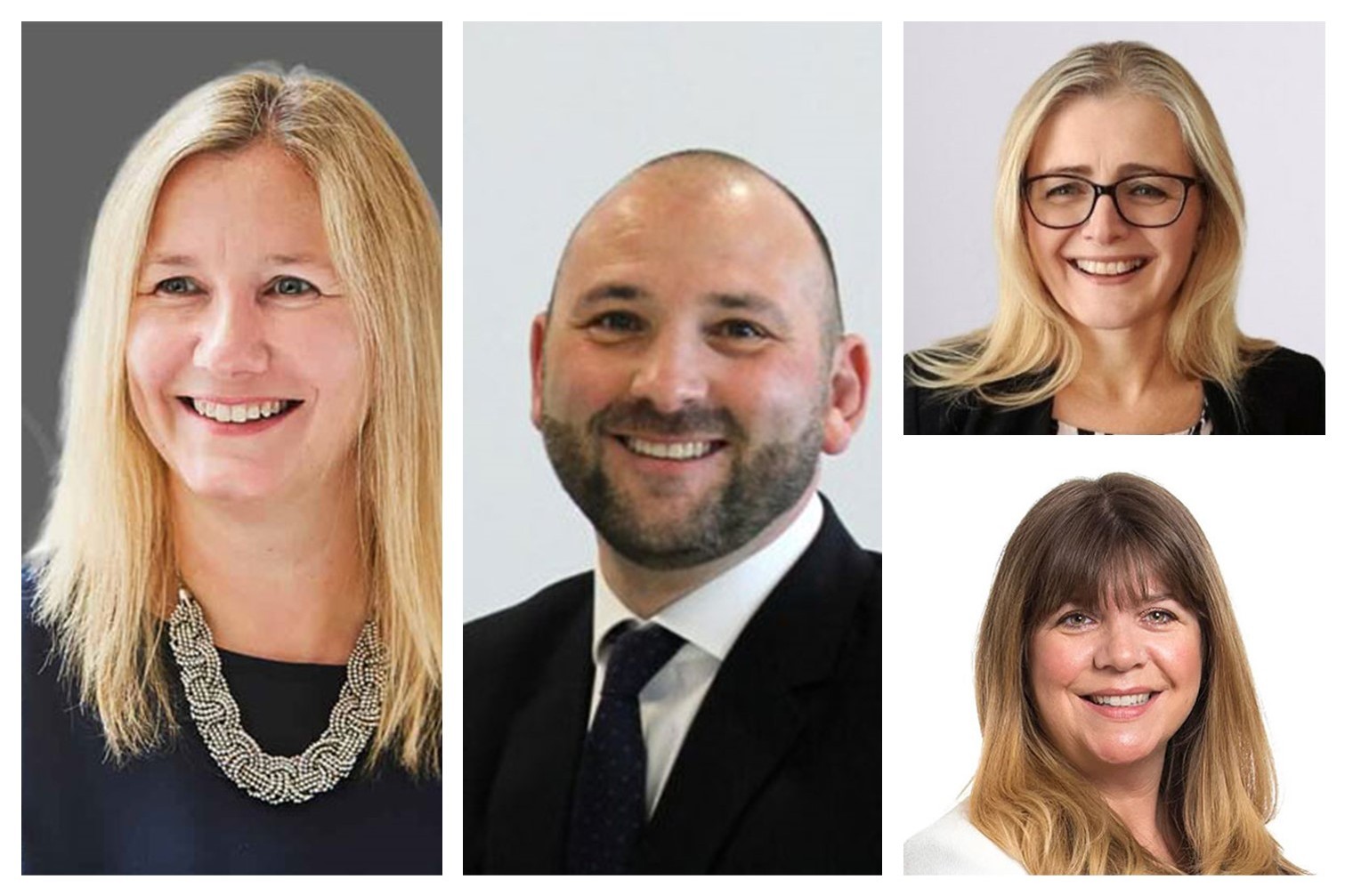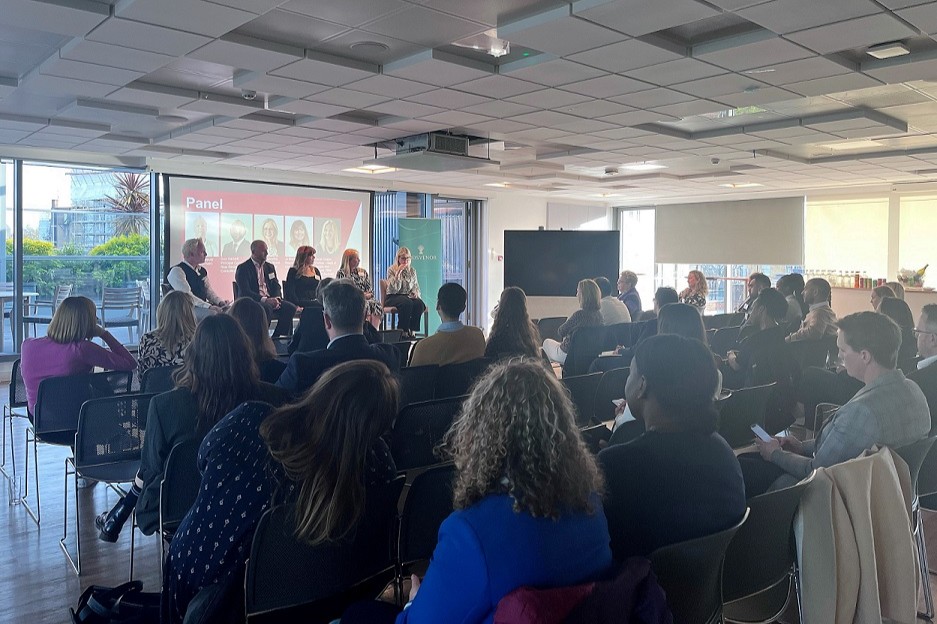By joining Real Estate Balance’s email list, you agree to receive email updates from time to time about organisation news, events being held and information about our partners in accordance with the terms outlined in our privacy notice, which you can read in full here.
Sign upFinding diverse talent is only half of the story: why adopting a ‘buy and build’ approach accelerates inclusion

People interested in progressing Diversity and Inclusion (D&I) in property and associated sectors recently gathered to discuss the importance of combining diverse recruitment practices with inclusive workplace cultures at an event organised by New Street Consulting Group, Grosvenor and Real Estate Balance.
The panel discussion was chaired by EG Deputy Editor Tim Burke and featured a range of voices to represent different parts of the industry:
- Jo Banfield, Human Resources Director, Grosvenor
- Sarah Draper, Partner - Head of People and Culture, Rider Levett Bucknall
- Guy Garnett, Principal Consultant, New Street Consulting Group
- Jody Goldsworthy, Partner, New Street Consulting Group
Tim opened the conversation by asking about the business and social cases for D&I in our workplaces. Guy made the point that diversity is not just about protected characteristics, it is also about diversity of thought and personality types, and that by leveraging this companies can have an opportunity to be better and more competitive businesses.
He added that New Street Consultant Group believes it is important to challenge their clients to look beyond the technical capabilities of individuals when it comes to recruitment, highlighting an example of being able to convince a client to offer a senior management opportunity to someone with a background from an unrelated industry because of their leadership skills and experience.
Sarah spoke about the value of diverse shortlists and said that she advocates looking outside the industry and at potential and an individual’s ideas, rather than just a candidate’s experience and whether they have a track record with a competitor.
She added that for many property and construction companies, being skilled in data and digital is highly relevant, especially in the context of where the industry will be in the next ten years, and that an industry background is not required to be talented in those areas.
Having worked in law, I think property is similar in that there is such a structured development and qualification process, that it is almost a case of having to take away the comfort blanket of that pathway and reassuring a hiring manager through assessment and other initiatives that you can bring people from different backgrounds into the industry.
Sarah Draper
Tim then asked Jodie “what does the best look like” when it comes to inclusive cultures and working environments.
Jodie said that the distinction between diversity and inclusion were vital considerations for employers, and one of the first steps on the journey should be to find out how colleagues feel and what are their actual lived experiences in the organisation, which can be done through conversations supplemented with surveys with a guarantee of anonymity.
She also believes that an organisation also needs to define what it wants its culture to be and for the dissonance between how it is and what it could be to be used as ammunition to influence decision makers into accelerating change.
There’s an assumption and a likelihood that someone who has experience of being excluded or is from an underrepresented group will behave in an inclusive way, but that’s not a guarantee; we need to convince ourselves through the hiring or promotion processes that they are going to demonstrate the behaviours for the culture we want.
Jody Goldsworthy
Sarah built upon Jodie’s points by adding that Rider Levett Bucknall is about to launch a competency framework to demonstrate to all levels of the business what inclusive behaviours look like and associated tools to help colleagues develop as individuals with the aim of improving the overall culture.
At Rider Levett Bucknall, a key ‘cultural rock’ is empowering every employee to not walk past and to call out inappropriate attitudes and behaviours when they witness them. All of the senior leaders at the company have also been paired with a reverse mentor from their D&I community.
An audience member asked the panel how to deal with teams which did not want to change, and Jo highlighted a recent initiative at Grosvenor whereby teams were asked to engage with a personality insights tool and then have conversations about each other’s similarities and differences and how to get the best out of each other. She suggested one of the keys to its success may have been that it was not labelled as a D&I programme.
Jo also reacted to an audience member who asked the panel about the perception problem property has in awareness with young people and whether the sustainability agenda could be a driver to attracting talent, with Jo having brought up issues around the so-called ‘secret sector’ earlier in the conversation.

We probably don’t talk about it enough, but we are driven by the difference we can make, not just with environmental sustainability but with social impact… From a Grosvenor perspective, our ownership structure is somewhat different from others, and demonstrating continually that we do good is really important - and we spend a lot of time thinking about how we can be leaders.
Jo Banfield
The panel also answered other questions from attendees.
On how to gauge how inclusive the culture is before joining a company, the panel recommended that candidates value their own skillsets, be selective about what companies they are interested in joining and understand that the property industry is so broad with many different roles and opportunities.
Other recommendations included asking about D&I strategies, employee turnover and open questions about culture at interviews. Further into the recruitment process, perhaps at the shortlist stage, the panel also felt it would be appropriate to ask to speak to someone other than the interviewers about the firm’s culture.
More and more of our clients are offering prospective candidates the opportunity to speak to people who aren’t just senior people but throughout the organisation because it gives greater insight into the career paths on offer. We do it at NSCG and it is really helping our business.
Guy Garnett
Another audience member asked for the panel’s views on quotas for recruitment shortlists, with one expressing an aversion to them on the basis that nobody wants to be in a role because of anything other than their own merits.
One attendee also suggested the need for a ‘Netflix-style show’ to give prominence to the diversity of roles and people we have in real estate, “because if you can’t see it, you can’t be it”.
The panel was also asked how to accelerate the pace of change on D&I in real estate, and the panellists agreed that one thing the industry benefits from is a cross-company commitment to sharing best practices and working together on the issues we cannot solve as individuals.
All of us at Real Estate Balance are very thankful to the attendees for contributing to such an engaging and interesting session, to Tim, Jo, Sarah, Guy and Jody for sharing their insights and to New Street Consulting Group and Grosvenor for partnering with us on such an inspiring event.